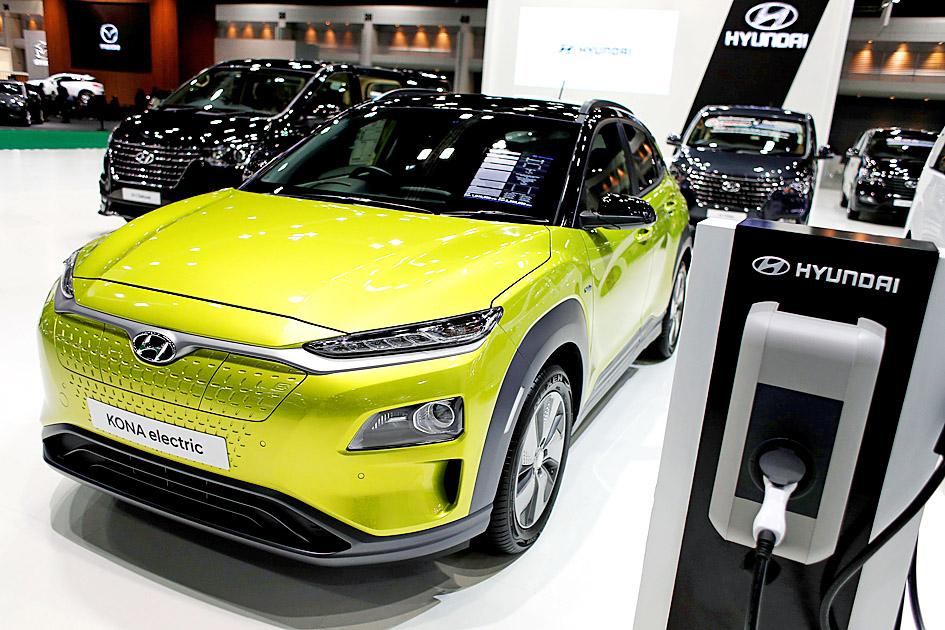Hyundai Motor Group is to invest S$400 million (US$294 million) in a new innovation center in Singapore that Singaporean Prime Minister Lee Hsien Loong (李顯龍) said might produce up to 30,000 vehicles a year by 2025.
“Automotive activities are becoming viable in Singapore once again,” Lee said in a speech yesterday to mark the virtual groundbreaking ceremony for the center in the city-state’s west.
Electric vehicles (EVs) “have a different supply chain, fewer mechanical parts and more electronics, which plays to Singapore’s strengths,” he said.

Photo: Reuters
The seven-story building, which is expected to be completed by the end of 2022, is where Hyundai would work on developing artificial intelligence (AI), big data and other technologies to enhance its manufacturing processes, fine-tuning the “brains” behind the smarter and more environmentally friendly vehicles of tomorrow.
The center would also have a 620m driving track near its roof so that customers can test drive vehicles.
Hyundai would “instill human-centered values” in all stages of a vehicle’s life, from ordering and production to the test drive and service, Hyundai Motor executive vice chairman Euisun Chung said at the event.
The company is separately developing flying cars, planning a full lineup of aerial vehicles that it envisages zigzagging city skies within a decade.
The innovation center would also house a small-scale electric-vehicle production facility to test processes using AI and autonomous driving.
One of the company’s EVs, the Kona, has been recalled in South Korea following multiple reports of battery fires.
“We hope this will open up new growth areas for our economy, and create exciting jobs for Singaporeans, for example industrial Internet of Things engineers, data scientists, cobot technicians and digital supply chain strategists,” Lee said.
Lee also said the center marked “an important milestone in the economic relationship between Singapore and South Korea,” paving the way for more South Korean firms to invest in the city-state and partner with local suppliers.
Singapore has not had an auto manufacturing plant since Ford Motor Co closed its factory several decades ago, effectively ending automobile production on the island.
In October last year, vacuum cleaner maker Dyson Ltd abandoned a US$2.5 billion plan to build electric vehicles in the city-state because it could not find a way of making the project commercially viable.
Tesla Inc, the world’s biggest maker of EVs, has plans to export China-built Model 3 cars to Singapore, and other places in Asia and Europe from its factory in Shanghai, people familiar with the matter said last month.

Micron Memory Taiwan Co (台灣美光), a subsidiary of US memorychip maker Micron Technology Inc, has been granted a NT$4.7 billion (US$149.5 million) subsidy under the Ministry of Economic Affairs A+ Corporate Innovation and R&D Enhancement program, the ministry said yesterday. The US memorychip maker’s program aims to back the development of high-performance and high-bandwidth memory chips with a total budget of NT$11.75 billion, the ministry said. Aside from the government funding, Micron is to inject the remaining investment of NT$7.06 billion as the company applied to participate the government’s Global Innovation Partnership Program to deepen technology cooperation, a ministry official told the

Taiwan Semiconductor Manufacturing Co (TSMC, 台積電), the world’s leading advanced chipmaker, officially began volume production of its 2-nanometer chips in the fourth quarter of this year, according to a recent update on the company’s Web site. The low-key announcement confirms that TSMC, the go-to chipmaker for artificial intelligence (AI) hardware providers Nvidia Corp and iPhone maker Apple Inc, met its original roadmap for the next-generation technology. Production is currently centered at Fab 22 in Kaohsiung, utilizing the company’s first-generation nanosheet transistor technology. The new architecture achieves “full-node strides in performance and power consumption,” TSMC said. The company described the 2nm process as

Shares in Taiwan closed at a new high yesterday, the first trading day of the new year, as contract chipmaker Taiwan Semiconductor Manufacturing Co (TSMC, 台積電) continued to break records amid an artificial intelligence (AI) boom, dealers said. The TAIEX closed up 386.21 points, or 1.33 percent, at 29,349.81, with turnover totaling NT$648.844 billion (US$20.65 billion). “Judging from a stronger Taiwan dollar against the US dollar, I think foreign institutional investors returned from the holidays and brought funds into the local market,” Concord Securities Co (康和證券) analyst Kerry Huang (黃志祺) said. “Foreign investors just rebuilt their positions with TSMC as their top target,

POTENTIAL demand: Tesla’s chance of reclaiming its leadership in EVs seems uncertain, but breakthrough in full self-driving could help boost sales, an analyst said Chinese auto giant BYD Co (比亞迪) is poised to surpass Tesla Inc as the world’s biggest electric vehicle (EV) company in annual sales. The two groups are expected to soon publish their final figures for this year, and based on sales data so far this year, there is almost no chance the US company led by CEO Elon Musk would retain its leadership position. As of the end of last month, BYD, which also produces hybrid vehicles, had sold 2.07 million EVs. Tesla, for its part, had sold 1.22 million by the end of September. Tesla’s September figures included a one-time boost in